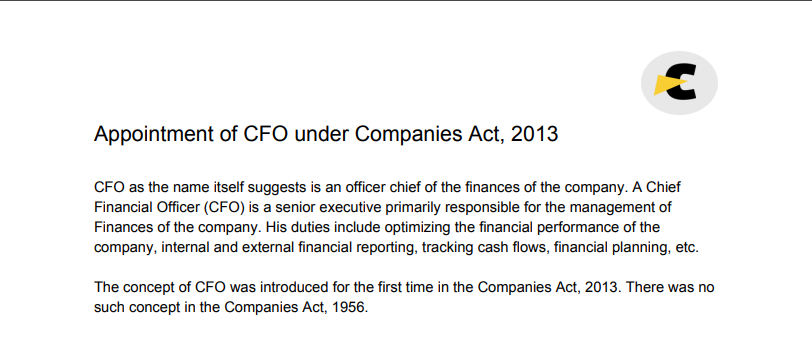Appointment of CFO under Companies Act, 2013
Table of Contents
- Appointment of CFO under Companies Act, 2013
- Meaning of Chief Financial Officer (CFO)
- Who can appoint a CFO in a company?
- Who is required to appoint a CFO under the Companies Act, 2013?
- What is the qualification required to be appointed as a CFO?
- What is the position of a CFO in the company?
- What is the remuneration of a CFO?
- What are the responsibilities of a CFO?
- What is the process for the appointment of the CFO in a Company?
- What will happen in case of failure to appoint a CFO?
- Read the Copy:
Appointment of CFO under Companies Act, 2013
CFO as the name itself suggests is an officer chief of the finances of the company. A Chief Financial Officer (CFO) is a senior executive primarily responsible for the management of the Finances of the company. His duties include optimizing the company’s financial performance, internal and external financial reporting, tracking cash flows, financial planning, etc.
The concept of CFO was introduced for the first time in the Companies Act, 2013. There was no such concept in the Companies Act, 1956.

Meaning of Chief Financial Officer (CFO)
Section 2(19): “Chief Financial Officer” means a person appointed as the chief financial officer of a company.
Who can appoint a CFO in a company?
A CFO may be appointed either by the Board of Directors or by the Company’s Managing Director.
Who is required to appoint a CFO under the Companies Act, 2013?
As per Section 203 of the Companies Act, 2013, every public company having paid-up share capital of Rs. 10 Crore or more shall have a whole-time Key Managerial Personnel, which includes the whole time Chief Financial Officer.
Related Topic:
Companies Act, 2013 – Rotation of auditors for Private Companies
The following companies are required to appoint a CFO:
- Every listed company;
- Every other public company having a paid-up share capital of Rs. 10 Crore or more.
What is the qualification required to be appointed as a CFO?
The act does not prescribe any qualification for the appointment of a CFO.
What is the position of a CFO in the company?
The position of the CFO is recognized for the first time in the Companies Act, 2013. He is a person occupying the position of CFO and is responsible for overseeing the financial activities of the entire company. Due to his role in the company he has been included in the Officer in default. To be a CFO one needs not to be the director of the company. Although, he has been recognized as the Key Managerial Personnel (KMP).
A CFO cannot hold office as a CFO in more than one company except in its subsidiary company at the same time. However, he can hold office in another company as a director with the permission of the Board.
What is the remuneration of a CFO?
The remuneration payable to a CFO is not regulated by the provisions of Section 197 read with Schedule V of the Companies Act, 2013, unless he is a part of the Board of Directors or appointed as a manager in addition to his position as the CFO.
What are the responsibilities of a CFO?
A CFO is responsible for the following:
- Overseeing the financial activities of the company.
- Signing the Financial Statements of the company whether he is a KMP or not.
- Presenting Financial Statements truly & Fairly.
- Keeping track of the day-to-day financial operations of the company.
What is the process for the appointment of the CFO in a Company?
The following procedure is followed for the appointment of a CFO in a company.
- Conducting a meeting of Nomination and Remuneration Committee
Where a Company is required to form a Nomination and Remuneration Committee, shall receive a recommendation from the committee for the appointment and remuneration of the CFO.
- Obtain recommendations from the Audit Committee
Where a Company is required to form an Audit Committee, shall receive a recommendation from the committee for the appointment and remuneration of the CFO.
- Call of the meeting of Board of Directors
- Notice of board of meeting with the draft resolution is to be prepared for all the directors in the board meeting for candidate consideration for appointment as CFO.
- Send the notice along with the agenda, notes to the agenda.
- Hold the board meeting and pass a Board Resolution to approve the appointment of the CFO.
- Issue an Appointment letter to the candidate newly appointed as CFO.
- Listed Company shall submit the Outcome of Board Meeting to Stock exchange within 30 minutes from the conclusion of the meeting.
- Preparing & circulating draft minutes of the conclusion of the board meeting within 30 days.
- File Form DIR-12 within 30 days of the appointment of CFO along with the following documents.
- A certified true copy of board resolution
- Letter of appointment
- Any other document required
- File FORM MR-1 with Roc within 60 days.
- Making necessary entries in register of Director and Key Managerial Personals, minutes book, etc.
What will happen in case of failure to appoint a CFO?
Any company which is required to appoint CFO mandatorily, If fails to appoint a CFO, shall be liable to pay a penalty of ₹5 Lakhs & every director & the key managerial person who is in default shall be liable to Penalty of ₹50,000 & where the default is continuing one, Further penalty of ₹1000 per day maximum of ₹5 lakhs.









